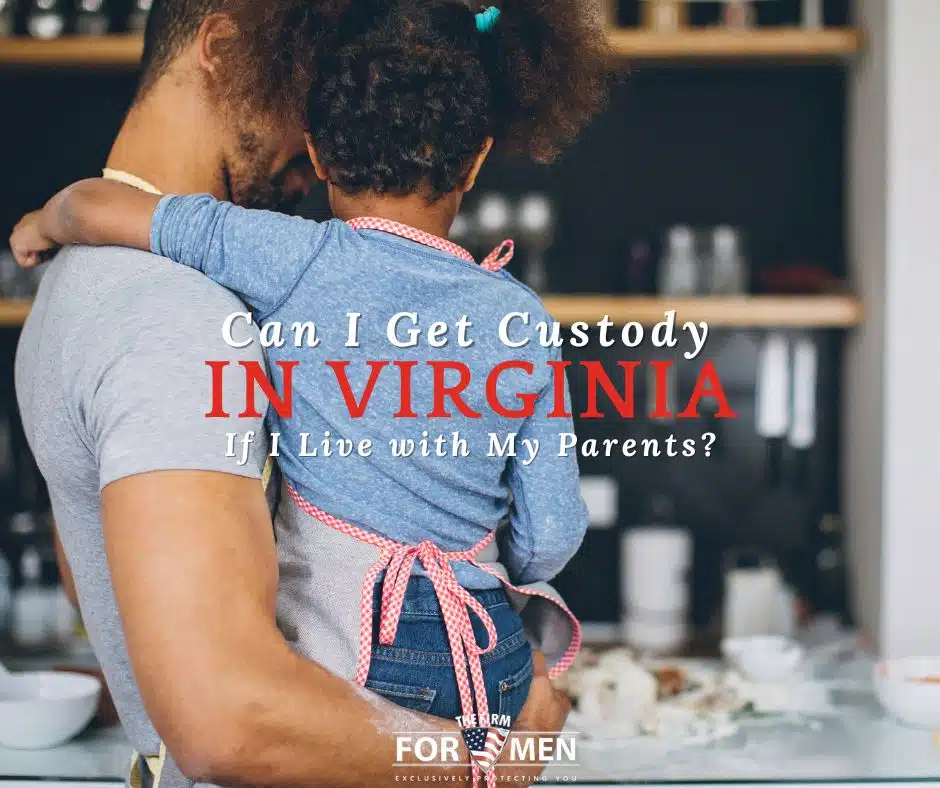Once upon a time in Virginia, multigenerational families were normal. The recent pandemic and economic uncertainties have resurrected a return to adult children living with their parents. The U.S. Census Bureau tells us 56 percent of adults ages 18 to 24 lived in their parental home, with 16 percent of adults ages 25 to 34 living with their parents in 2022. Can a divorced adult child living in the parental home get child custody?
Jump to a Section
The Courts Probably Don’t Care
Unless your parents are the likes of Ma Barker and Charles Harrelson, Virginia’s courts may care not a piffle that you live with Mom and Dad and want to raise Baby under their roof. (Ma Barker, head of the Bloody Barker Gang that included her three adult sons, rivals only actor Woody Harrelson’s hitman father Charles for the title of Least Fit Parent of the Year.)
Important aspects of being a fit parent are tucked into Virginia Code § 20-124.3 at excruciating length, but we will de-stultify and abbreviate some of them here:
- Can you meet the needs of your child’s physical and mental health, including the child’s changing developmental needs?
- As a competent adult, are you in good physical and mental condition?
- Can you prove you have a healthy, ongoing relationship with your child?
- Have you demonstrated the ability to accurately assess and meet the emotional, intellectual, and physical needs of the child?
- How will you ensure stability of other important relationships of the child, including but not limited to siblings, peers, and extended family members?
- What role will you play in your child’s life, upbringing, and care in the future?
- Are you able to cooperate with the child’s other parent to resolve disputes regarding matters affecting the child?
- Do you or anyone in the household have any history of family abuse, sexual abuse, child abuse; or acts of violence, force, or threat?
What’s Your Backup Plan?
The court may look favorably on the redundancy inherent in living with Mom and Dad (or, from your kids’ perspective, Granny and Grampa). The courts are charged by law to look to the “best interests of the child,” which means the Virginia Circuit Court judge wants to see a complete parenting plan:
- Who will pick up Baby from daycare if Dad has to work late?
- Who will make a pot of Brunswick stew every Sunday through the winter?
- What is Dad’s plan to deal with school vacations?
- Does someone in the house have a good recipe for banana pudding?
- Who will take Baby to the doctor when Dad is out of town on business?
- Are you going to finish those ham biscuits?
We might have strayed off course a bit there (hey, lunchtime is nigh), but you get the idea. Family means extra hands to help out. A judge who knows you have two additional adults in the home to help raise Baby can feel comfortable with a custody ruling.
As long as Grandmama and Granddaddy have no criminal history that could harm the child, the court will generally be happy to know you have a backup plan — free babysitting, free chauffeur service, free country cooking — in place.
Virginia Law: No Presumption or Inference
In placing a child with either parent, the Virginia Circuit Court judge is bound by law to place no “presumption or inference of law in favor of either” as laid out in Virginia Code § 20-124.2. You as the Dad have just as much right as the mother to custody.
Unsure if the home owned by Grammy and Gramps is safe for your child, in the eyes of the court? Take a tip from the Virginia Department of Housing and Community Development (DHCD) and follow the DHCD checklist for habitability:
- Your parents’ home is structurally sound
- Your parents’ home protects the residents from the elements
- Everyone has adequate space and security for themselves and their belongings
- Each family member has an acceptable place to sleep
- Every room or space has natural or mechanical ventilation
- Your parents’ home is free of air pollutants at levels that threaten the health of residents
- An adequate water supply, free of contaminants, is available
- Sufficient sanitary facilities, in proper operating condition, are available to use in privacy and are adequate for personal cleanliness and human waste disposal
- Your parents’ home has adequate, working heating and/or cooling facilities
- Natural or artificial illumination to permit normal indoor activities and to support the health and safety of family members is available and reliable
- Your parents’ home has an electrical system powerful enough to permit the use of essential electrical appliances while assuring fire safety
- All food preparation areas contain suitable space and equipment to store, prepare, and serve food in a sanitary manner
- Your parents’ home is maintained in sanitary condition
- The home includes at least one battery-operated or hard-wired smoke detector, in proper working condition, on each occupied level of the unit, with smoke detectors located, to the extent practicable, in a hallway adjacent to a bedroom
A Virginia judge may not ask to see such a checklist, but the court has a duty to investigate the home to ensure the child will be safe. Having your family law attorney present the court with photographic evidence and the checklist helps put to rest any concerns.
Take heart knowing your return to the family homestead should not lessen your chances of child custody. Take heart knowing The Firm For Men stands ready to defend your rights and to represent you in child custody matters. Contact us online today or telephone our offices at (757) 383-9184 to learn more about what we can do for you!

